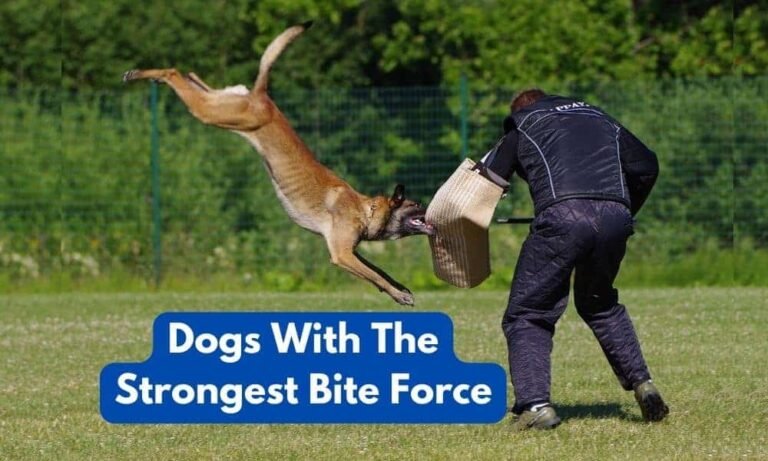Can Dogs Eat Rawhide Chews? Is Rawhide Chews Bad For Dogs?
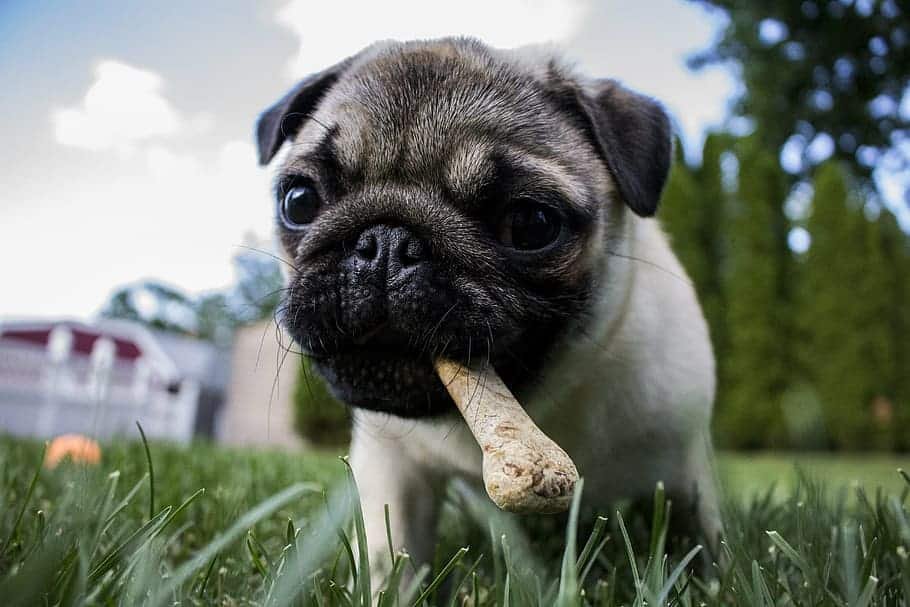
Rawhide chews are a popular choice among dog owners as a means to satisfy their dogs’ chewing instincts. These treats are typically made from the inner layer of cow or horse hides, processed, and shaped into various forms. While rawhide chews can offer entertainment and dental benefits for dogs, pet owners must be aware of the potential risks and make informed decisions regarding their use. Hence the question, “Can dogs eat rawhide chews?”
In this comprehensive guide, we aim to provide new and existing dog owners with valuable insights into the topic of feeding rawhide chews to dogs. We will delve into the composition of rawhide, potential risks associated with their consumption, safety considerations, and alternative options available. By the end of this article, you will have a thorough understanding of whether dogs can eat rawhide chews and how to prioritize the safety and well-being of your furry companions.
Can Dogs Eat Rawhide Chews Or They Just Chew It?
Dogs naturally have a chewing instinct, and rawhide can provide relief for puppies during teething and help maintain dental hygiene in adult dogs. However, the potential risks associated with rawhide, such as blockages and choking hazards, should be considered.
As a result, the question of whether dogs can eat rawhide chews seems like a controversial topic among veterinarians. While some recommend them for dental health and chewing satisfaction, others strongly oppose them due to the risk of choking or intestinal blockage. For instance, the Humane Society and ASPCA generally discourage the consumption of rawhide by pets.
Therefore, it’s important to carefully supervise dogs while they chew on rawhide and consult with a veterinarian to determine the best options for your dog’s dental health and chewing needs.
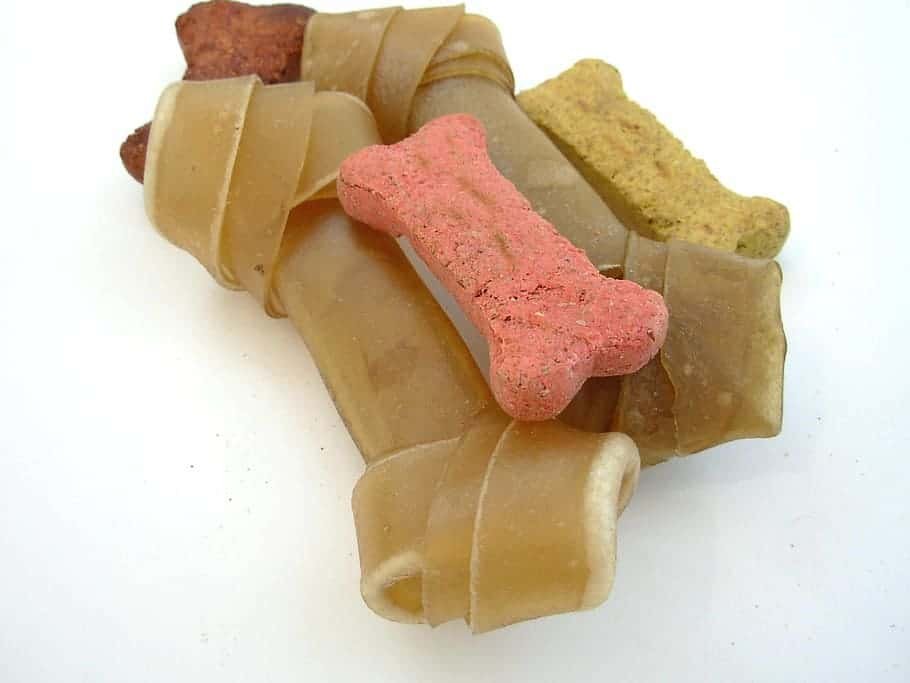
Is rawhide safe for puppies?
Rawhide can be safe for puppies when used with caution. It can help relieve teething discomfort and provide mental stimulation. However, it’s important to choose appropriately sized rawhide chews for puppies to prevent choking hazards.
Puppies should be supervised while chewing and any small or broken pieces should be removed promptly. Some puppies may have sensitive stomachs, so monitor for any digestive issues.
Additionally, consider alternative chew options specifically designed for puppies, such as soft rubber toys or puppy-specific dental chews. Consult with your veterinarian for personalized advice based on your puppy’s breed, size, and individual needs.
What Are Rawhide Dog Treats Made Of?
Rawhide dog treats are made from the inner layer of cow or horse hides. The hides undergo a process of cleaning, cutting, and shaping into various shapes and sizes. The hides are typically treated with chemicals, such as sodium sulphide, to remove hair and fat. After that, the hides are washed, sometimes bleached, and then pressed into sheets or formed into chews or bones.
These treats are often flavored or colored to make them more appealing to dogs. It’s important to note that the quality and safety of rawhide treats can vary, so it’s advisable to choose high-quality options from reputable brands and to supervise your dog while they chew on them.
What Are The Benefits Of Rawhide?
Rawhide chews can provide several benefits for dogs when used appropriately:
- Dental health: Chewing on rawhide can help promote dental hygiene by reducing plaque and tartar buildup. The mechanical action of chewing can help scrape away food particles and stimulate saliva production, which can contribute to fresher breath and healthier teeth and gums.
- Mental stimulation: Dogs have a natural instinct to chew, and providing them with appropriate chew treats like rawhide can help satisfy this instinct. Chewing can provide mental stimulation, relieve boredom, and help reduce destructive chewing behaviors.
- Stress and anxiety relief: Chewing can be a calming activity for dogs, particularly during stressful situations. Rawhide chews can serve as a way for dogs to relieve anxiety, relax, and cope with separation anxiety or other stressful events.
- Teeth and jaw exercise: Chewing on rawhide chews can help exercise the jaw muscles and provide a workout for the teeth. This can contribute to stronger jaw muscles and potentially help maintain healthier teeth alignment.
- Long-lasting entertainment: Rawhide chews are typically long-lasting treats that can keep dogs occupied and entertained for extended periods. This can be particularly beneficial for dogs who tend to get bored easily.
Why Is Considered Rawhide Bad For Dogs?
Some rawhide can be considered bad for dogs due to several reasons:
1. Choking and blockage hazards:
Rawhide chews can pose a risk of choking or blockage if dogs bite off large pieces or swallow them whole. These pieces can get lodged in the throat or the digestive tract, leading to severe health issues.
2. Digestive problems:
Rawhide is not easily digestible for all dogs. Ingesting large amounts or swallowing chunks of rawhide can cause digestive upset, including vomiting, diarrhea, and gastrointestinal discomfort.
3. Allergic reactions:
Some dogs may be allergic or sensitive to the materials used in rawhide treats, leading to skin irritations, itching, or other allergic reactions.
4. Chemicals and additives:
Some low-quality rawhide treats may contain chemicals and additives that are potentially harmful to dogs. These can include bleaches, preservatives, artificial flavors, and colors, which may have adverse effects on a dog’s health.
5. Sourcing and processing concerns:
The sourcing and processing of rawhide can vary, and lower-quality rawhide treats may come from poorly regulated or questionable sources. This can increase the risk of contamination and the presence of harmful bacteria.
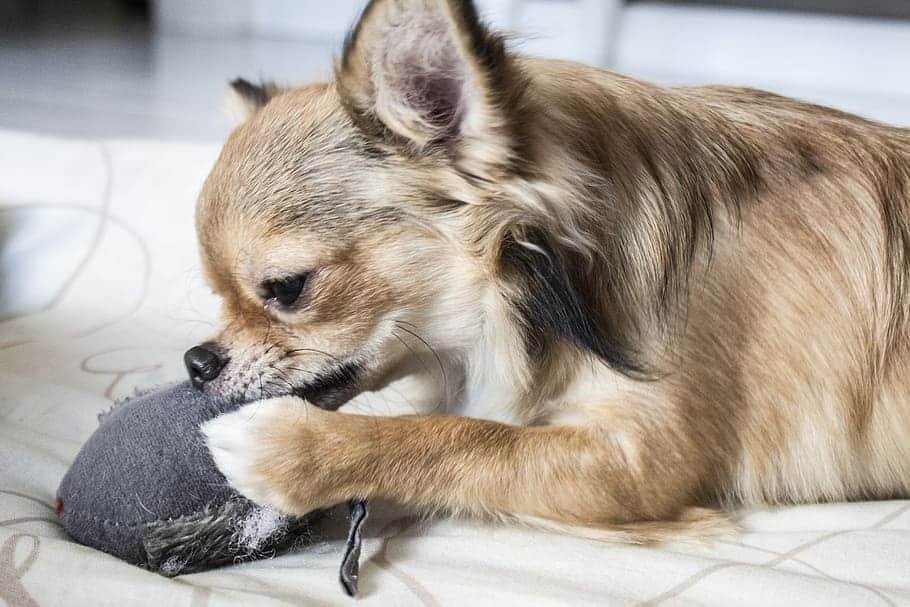
Tips For Picking The Right Rawhide Chews For Dogs
To make rawhide chews safer for your dog, you can follow these guidelines:
1. Choose high-quality rawhide:
Opt for rawhide chews from reputable brands that prioritize safety and quality. Look for products made from natural ingredients without added chemicals or preservatives.
2. Size matters:
Select rawhide chews that are appropriate for your dog’s size. Avoid small or thin pieces that can be easily swallowed or pose a choking hazard. The chew should be large enough that your dog cannot fit the whole piece into their mouth.
3. Supervise your dog:
Always monitor your dog while they chew on a rawhide treat. This allows you to intervene if they start biting off large pieces or exhibit aggressive chewing behavior. Promptly remove any small, broken, or overly chewed portions to prevent choking.
4. Limit chewing time:
Set a time limit for chewing sessions with rawhide. Prolonged chewing can increase the risk of digestive problems or blockages. After a reasonable amount of time, take away the rawhide and store it for future use.
5. Offer alternatives:
Consider providing alternative chew toys or treats that are safer and more digestible, such as rubber toys, nylon chews, or dental chews specifically designed for dogs.
6. Consult with your vet:
If you have any concerns or specific questions about your dog’s safety with rawhide chews, it’s always a good idea to consult with your veterinarian. They can provide personalized advice based on your dog’s health, breed, size, and chewing habits.
Types Of Dogs That Should Avoid Rawhide Treats
Certain dogs should avoid rawhide chews due to potential risks. For example;
- Dogs with digestive sensitivities may experience digestive upset such as vomiting or diarrhea.
- Breeds prone to choking hazards, like Bulldogs or Pugs, should avoid rawhide.
- Aggressive chewers who bite off large chunks pose a choking or blockage risk.
- Dogs with known allergies or sensitivities should opt for hypoallergenic alternatives.
It’s important to consult with a veterinarian to determine if rawhide is suitable for your dog. Consider their health, breed, size, and individual needs. By assessing these factors, you can make informed decisions and choose safer chew options to avoid potential issues associated with rawhide chews.
Alternatives To Rawhide Chews For Dogs
There are several alternatives to rawhide chews that you can consider for your dog:
- Bully sticks: Bully sticks are natural, long-lasting chews made from dried beef pizzle. They are highly digestible and provide a similar chewing experience to rawhide.
- Dental chews: Dental chews are specifically designed to promote dental health by reducing plaque and tartar buildup. Look for options that have a texture or ingredients that help clean your dog’s teeth.
- Natural bones: Raw or cooked bones, like marrow bones or knucklebones, can provide a satisfying and long-lasting chew. Ensure the bones are appropriate for your dog’s size and avoid cooked bones that can splinter.
- Rubber chew toys: There are various durable rubber chew toys available that are designed to withstand vigorous chewing. Look for ones that are made from safe materials and are designed to be tough and long-lasting.
- Stuffed Kongs or puzzle toys: Fill Kongs or puzzle toys with treats or food to engage your dog’s mind and keep them occupied. These toys provide mental stimulation and can help redirect chewing behaviors.
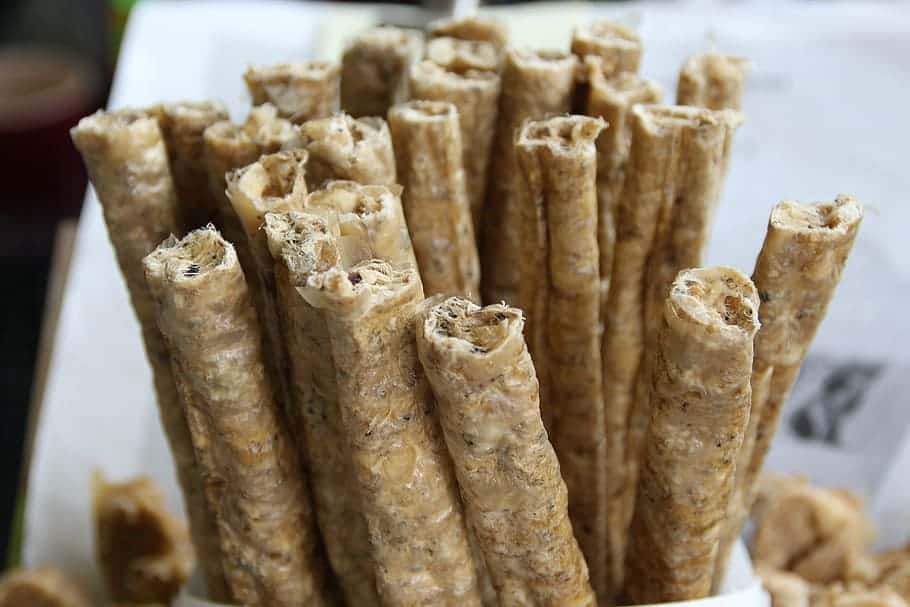
How Long Does It Take For A Dog To Digest Rawhide?
The digestion time for rawhide can vary depending on several factors, including the size of the rawhide piece and the individual dog’s digestive system. In general, it can take dogs anywhere from a few hours to a few days to fully digest rawhide.
Smaller and thinner pieces may be digested more quickly, while larger or denser rawhide chews may take longer to break down and pass through the digestive tract.
It’s important to monitor your dog for any signs of digestive issues, such as vomiting, diarrhea, or discomfort, and consult with a veterinarian if you have concerns about your dog’s digestion or if they experience any difficulties after consuming rawhide.
Rawhide Can Damage Teeth of Dogs?
Rawhide chews have the potential to damage the teeth of dogs if not used properly. The hardness of some rawhide chews can lead to tooth fractures or wear, and inappropriate sizing or irregular shapes can pose a risk of injury.
Also, lower-quality rawhide treats may have rough textures that can damage tooth enamel or irritate the gums. To minimize the risk, choose appropriately sized rawhide chews, supervise your dog while they chew, and inspect the chew regularly for wear or sharp edges.
Frequently Asked Questions Related to “Can Dogs Eat Rawhides Chews?”
What are the risks of dogs eating rawhide chews raw?
Dogs consuming rawhide chews in their raw form can experience digestive issues, including stomach upset, vomiting, and diarrhea. Additionally, there is an increased risk of choking or blockage when dogs attempt to swallow large or unprocessed pieces of rawhide.
Why is it important to avoid feeding dogs rawhide chews raw?
Feeding dogs rawhide chews raw can lead to potential health problems. The rawhide may be difficult for dogs to digest, causing gastrointestinal discomfort and potential blockages. It is crucial to prioritize the safety and well-being of your dog by providing properly processed and safe rawhide chews.
Can rawhide chews be cooked before giving them to dogs?
It is generally not recommended to cook rawhide chews before giving them to dogs. Cooking can alter the texture and properties of the rawhide, making it harder to digest and potentially causing it to splinter. It is best to follow the instructions provided by the manufacturer and give the rawhide chews to dogs as intended.
Are there any alternatives to feeding dogs rawhide chews raw?
Yes, there are plenty of alternative chew options available for dogs that are safer and more digestible than rawhide in its raw form. Some alternatives include rubber chew toys, nylon chews, natural bones (appropriate for your dog’s size), and dental chews specifically designed for dogs.
Can dogs with sensitive stomachs eat rawhide chews raw?
Dogs with sensitive stomachs are generally more prone to digestive issues when consuming rawhide chews raw. It is advisable to consult with a veterinarian to determine the best chew options for dogs with sensitive stomachs and to explore alternative choices that are more easily digestible.
What should I do if my dog accidentally eats rawhide chews raw?
If your dog accidentally consumes rawhide chews raw, it is recommended to monitor them closely for any signs of discomfort, choking, or digestive issues. If you notice any abnormalities or if your dog shows signs of distress, contact a veterinarian for immediate assistance.
Can puppies eat rawhide chews raw?
Puppies should not eat rawhide chews raw. Their delicate digestive systems may have difficulty processing rawhide in its raw form, leading to digestive upset or potential blockages. It is crucial to provide appropriate chew options specifically designed for puppies and consult with a veterinarian for personalized advice.
Are there any specific rawhide chews that can be safely consumed raw?
While rawhide chews are generally processed and shaped for safe consumption, it is always recommended to follow the manufacturer’s instructions. Some rawhide chews may be specifically designed to be softer and more easily digestible, but it is important to research and choose reputable brands that prioritize safety.
Can dogs of all sizes eat rawhide chews raw?
Dogs of all sizes should avoid consuming rawhide chews in their raw form. Regardless of their size, dogs can still experience digestive difficulties or choking hazards when consuming rawhide chews that have not been properly processed and shaped. It is best to choose appropriate chew options for your dog’s size and consult with a veterinarian for guidance.
Conclusion
In wrapping up this discussion on whether dogs can eat rawhide chews, it’s essential to remember that every dog is unique. What works for one may not work for another. While rawhide chews can provide certain benefits, we should approach them with caution. Consider your dog’s size, chewing habits, and any specific health concerns they may have.
Keep an eye on them while they enjoy their chew and be ready to switch to safer alternatives if needed. Remember, the well-being of our furry companions should always be our top priority. So, before making a decision, consult with your veterinarian, who can provide personalized advice based on your dog’s individual needs. Ultimately, it’s about finding the right balance between providing enjoyment and ensuring their safety.
Read Other Food Resources
- Can Dogs Eat Fig Newtons? Pure Facts You Need To Know
- Can Dogs Eat Salami? All You Need To Know
- Can Dogs Eat Salt And Pepper?
- Can Dogs Eat Quail Eggs?
- Can Dogs Eat Basil? All You Need To Know
References:
- Fetch By WebMD – Rawhide: Good or Bad for Your Dog?
- Purina – Is Rawhide Bad For Dogs?
- Preventive Vet – Safer Rawhide Chews for Dogs
- American Kennel Club – Are Rawhide Chews Dangerous for Dogs?




